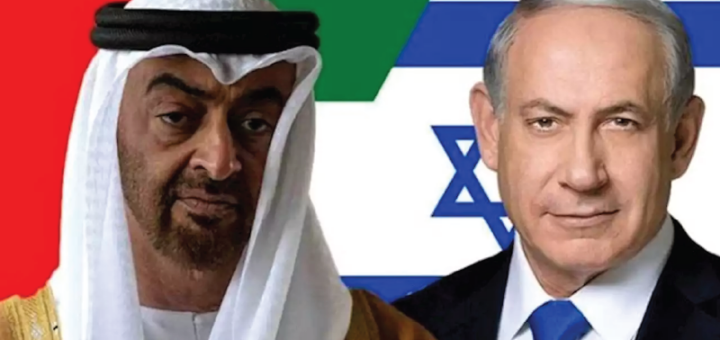The UAE-Israel Relations and its Impact on Palestinians

Introduction
For many decades, Arab and Muslim states have remained hostile towards Israel and supported the Palestinian cause. The 21st century has seen many developments that Israel has established with the world, especially the Arab countries. The Middle East has tried to modernise with time, including its foreign policy that has sparked debate on sensitive issues such as the Israel-Palestine conflict and the new peace deal. While Israel’s peace deals with the United Arab Emirates and Bahrain provides opportunities for trade, cybersecurity cooperation and lessens Israel’s isolation, it questions the chances of Palestinian independence.
The new peace-deal
Many experts and authors have tried to assess the significance of the peace deal in regard to the Israeli-Palestinian conflict. Different narratives emerge from the literature and media as the challenge to resolve the conflict increases. The ancient normative approach that has been applied to this issue was to isolate Israel, by countries closing their borders and restricting any economic exchange. This has resulted in assuring Palestinians that they have support from around the world. The emerging consensus among some scholars is that if Arab/Muslim countries establish peace with Israel, a better policy solution can be formed to resolve the Israel-Palestine conflict. However, the question is to what extent can the Muslim countries benefit from Israel’s growing economy and innovation by establishing trade relations?
 As experts and authors continue to reflect on the advantages of the peace deal, it is important to reflect on the intention of the countries recognizing Israel. The true nature of the peace deal seems to be based off on economic and trade relations, rather than to encourage a two-state solution regarding Israeli-Palestinian conflict. The initial statement issued by the UAE for the peace deal was to obstruct Israel’s plan of annexing the West Bank. However, as proclaimed by the Israeli officials, the UAE statement is invalid. The DAWN news published the reality of the “peace treaty” illusions developed by the UAE, that may cost the Palestinians their land and their rights. As per Turkey and Iran, the anti-Israel states, claim that the former US President Trump influenced the motive of establishing the peace deal, in order to promote US’ Gulf state allies’ bilateral relations. So, when the idea of reforming the methods to resolve the Israel-Palestinian conflict is concerned, the real intentions of the states must be acknowledged. This is because the ideology of a state has a great impact on its politics. If a capitalist country decides to recognise Israel to better trade relations, then the threat to Palestinians is significant. The new approach towards Israel may still put the Arab/Muslim countries in a difficult situation.
As experts and authors continue to reflect on the advantages of the peace deal, it is important to reflect on the intention of the countries recognizing Israel. The true nature of the peace deal seems to be based off on economic and trade relations, rather than to encourage a two-state solution regarding Israeli-Palestinian conflict. The initial statement issued by the UAE for the peace deal was to obstruct Israel’s plan of annexing the West Bank. However, as proclaimed by the Israeli officials, the UAE statement is invalid. The DAWN news published the reality of the “peace treaty” illusions developed by the UAE, that may cost the Palestinians their land and their rights. As per Turkey and Iran, the anti-Israel states, claim that the former US President Trump influenced the motive of establishing the peace deal, in order to promote US’ Gulf state allies’ bilateral relations. So, when the idea of reforming the methods to resolve the Israel-Palestinian conflict is concerned, the real intentions of the states must be acknowledged. This is because the ideology of a state has a great impact on its politics. If a capitalist country decides to recognise Israel to better trade relations, then the threat to Palestinians is significant. The new approach towards Israel may still put the Arab/Muslim countries in a difficult situation.
Cybersecurity perspective
The cyber security cooperation between Israel and the UAE has been established in the recent years. According to Al Jazeera, the UAE has poured hundreds of millions of dollars to purchase the Pegasus spyware from Israel based on the conditions set by Israeli Intelligence service. A Palestinian analyst, Issa uncovers that “the Palestinians are at the weakest point ever in history”.
The NSO group is an Israeli company that sells the product called Pegasus, which is a spyware for mobiles. The company was founded in 2010 and has over 500 cyber security experts. Pegasus is the company’s essential product, used for offensive hacking. According to Cooper Quintin, a cyber security specialist, Israel is one of the most sophisticated cyber actors in the world. This is because the Israeli forces are training its military officials to use such offensive hacking in their Defence department. The NSO company claimed that it was launched to detect and prevent terrorism but the people it has targeted is questionable, as human right activists, politicians, and the elites are usually the ones targeted. So, the question arises, who are the NSO clients? Although the company is supposed to work for the government and is legally advised to not sell its services, it extends it services to other countries. The spyware service has been sold to Mexico, Saudi Arabia, UAE and even Colombia.
 A possible analysis of UAE-Israel cybersecurity cooperation clearly indicates Israel’s ability to exploit confidential information of countries top officials with an advanced spyware in use. Israel can easily attain a position where rather than asking the US, it can turn to Saudi Arabia or UAE to make Palestinians accept a deal favourable for Israelis.
A possible analysis of UAE-Israel cybersecurity cooperation clearly indicates Israel’s ability to exploit confidential information of countries top officials with an advanced spyware in use. Israel can easily attain a position where rather than asking the US, it can turn to Saudi Arabia or UAE to make Palestinians accept a deal favourable for Israelis.
Conclusion
To witness Israel’s strength in cybersecurity and innovation, an allied sentiment of the Muslim countries on Israel-Palestinian conflict may be difficult to achieve. To approach Israel with a proposal for Israel-Palestinian conflict is risky business, as Israel has better and advance technology that can cause serious damage politically and economically to other countries. Considering the imbalance of power between majority of the Muslim countries and Israel, a safe approach would be to get Israel to recognise its boundaries with Palestine’s agreement before more countries open its borders to Israel with the intention of trade.

 United Arab List (UAL) leader Mansour Abbas has proposed collaborating with Netanyahu to resolve the needs of Israel’s 21 per cent Arab minority – a stance opposed by most Arabs, and which forced Abbas’ faction to break from a coalition of Arab parties ahead of the vote. However, it seems unlikely that Mansour Abbas will be added to the Netanyahu led coalition. Netanyahu may provide Abbas some benefits under Socio-economic development and political representation but not a seat in the government. Although Bennett’s right wing Yemina party is yet to decide if he wants to join Netanyahu’s coalition, there is a good chance that it will. What he has said to the press is that he will do what is good for the state of Israel, which indicates that he will go with Netanyahu and extract a high price from him. Since analysts highlight that Bennett is interested to gain the position of Minister of Justice and to implement changes in the ministry of Justice, it is possible that Netanyahu negotiates a position in the ministry of justice for Bennett. Besides, for helping Netanyahu form a government, he may want a rotating prime ministership as well.
United Arab List (UAL) leader Mansour Abbas has proposed collaborating with Netanyahu to resolve the needs of Israel’s 21 per cent Arab minority – a stance opposed by most Arabs, and which forced Abbas’ faction to break from a coalition of Arab parties ahead of the vote. However, it seems unlikely that Mansour Abbas will be added to the Netanyahu led coalition. Netanyahu may provide Abbas some benefits under Socio-economic development and political representation but not a seat in the government. Although Bennett’s right wing Yemina party is yet to decide if he wants to join Netanyahu’s coalition, there is a good chance that it will. What he has said to the press is that he will do what is good for the state of Israel, which indicates that he will go with Netanyahu and extract a high price from him. Since analysts highlight that Bennett is interested to gain the position of Minister of Justice and to implement changes in the ministry of Justice, it is possible that Netanyahu negotiates a position in the ministry of justice for Bennett. Besides, for helping Netanyahu form a government, he may want a rotating prime ministership as well.